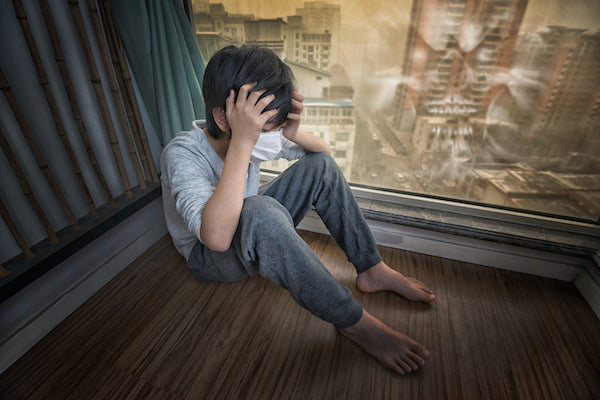
Air pollution isn’t good for any of us. As air quality worsens, so does our health. In cities with the highest levels of air pollution, residents have poorer sleep, decreased work performance, and are at risk for a variety of health issues including lung disease and cancer. However, adults don’t face the brunt of poor air quality’s effects. Instead, children are among the most at risk. Being aware of how air quality impacts children—and more importantly, how you can limit that effect—is the key to raising happy, healthy children.
Why Air Quality Impacts Children Most

Unlike adults, children’s lungs aren’t fully developed. As a result, children breathe in far more air much far more quickly than adults do. In fact, at birth, most children only have twenty-percent of an adult’s lung mass. As they reach their teenage years, they’ll eventually have a full, strong set of lungs. Until then, they’ll breathe in far greater quantities of air pollutants than any adult.
Beyond the amount of air, children breathe in, their ability to fight off the effects of air pollution is also far lower than an adult’s ability. Their immune systems aren’t as strong to fight off infections yet, meaning that they’re more likely to develop respiratory issues related to air pollution. As a result, air pollution is able to have a greater effect on a child’s overall health. That effect is also far more likely to be detrimental, since what would inconvenience an adult could become a developmental issue for a child.
Even taking physical factors out other picture, children remain at a higher risk to be impacted by poor air quality than adults. Unlike adults who often work in an office for large portions for the day, young children are far more likely to spend hours outside playing at parks or in their yard. Even school-aged children enjoy recess, putting them outside for significantly longer periods of time than most adults.
Parents Need To Pay Attention to Air Quality During Pregnancy Period

Expecting parents should pay particular attention to the air quality in their home. While children are especially at risk when it comes to the dangers of air pollution, new studies suggest that even fetuses can face the effects of poor air quality. Sadly, an adult’s ability to fight off low levels of pollutants does help protect the baby too much.
Women who were exposed to low levels of particulate matter—solid particles that come from car exhaust and other sources—were far more likely to have a preterm birth. In fact, even if all other risk factors were addressed, exposure to air pollution still managed to cause a spike in the rate of preterm births in several cities. This can result in a variety of health problems for the premature infant, all of which could be avoided with steps to better manage air quality.
What Air Pollution does to a Children’s Lungs

One of the biggest sources for information on childhood lung development and its relationship to air pollution in the Southern California Children’s Health Study. Researchers tracked nearly two-thousand teenagers who were born in the 1990s and early 2000s. They found that teenagers who were raised in communities with higher levels of air pollution were far more likely to have decreased lung development. As adults, this may never be remedied resulting in lifelong reduced lung capacity. The decrease in lung development experienced by these teens is comparable to that of children raised by parents who smoke.
These impacts extend to lung function, with children from cities with high levels of air pollution being more likely to have asthma and other respiratory issues. And while the teenagers studied have yet to reach adulthood, it’s fair to predict that they’ll be more likely to develop issues such as lung disease and cancer.
A portion of the air pollution is impossible to avoid without government action. We all have to go outside, and we can’t avoid breathing while we do it. However, indoor air can be far more dangerous than outdoor air. As a result, managing indoor air quality and limiting children’s exposure to pollutants can ensure that their lung development and overall health are severely impacted by air pollution.
Managing Air Quality During Childhood

A follow up to the study above has given parents everywhere some hope. In the late 2000s, California made significant efforts to improve its air quality. To test the effects of those improvements, the same researchers studied teenagers who grew up from 2007 to 2011. They found, that due to the better air quality, these children had improved lung function and capacity. The health risks that children just a few years older suffer from were beginning to disappear.
While not every state will work as hard to improve overall air quality, you can take steps to ensure the air quality in your home is at the highest standard possible! First, you can clean well and often. You should focus on removing dust, pollen, and pet dander in particular. These common allergens can get in the lungs and make breathing especially difficult for children. A good step could also be to remove carpeting and rugs, as they’ll collect and hold all of those irritants –releasing them with every step. Hardwood, tile, and laminate are much more lung-friendly options.
You should also do your best to avoid introducing harsh chemicals to your home. This means limiting the use of household cleaners, instead focusing on natural cleaners such as vinegar. The chemicals released by many common household products can have a disastrous effect on childhood health. Volatile organic compounds are particularly dangerous.
Lastly, you should consider improving ventilation and filtering the air in your home. Opening a window can work wonders (when it isn’t allergy season) to improve air quality. Beyond that, the right air purifier and air monitor can help you keep everything in check. Being aware of the potential risks in your home is one of the first steps to ensuring your child’s future health.
